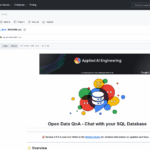agentic ai
Basic Information
Agentic AI is a small proof-of-concept repository and curriculum-style project organized as a week-by-week plan to explore building agentic systems. The README outlines eight weekly focuses that progress from building simple ReAct and chain-of-thought agents that can take actions and call tools, through adding external API/tool use and integrating vector databases for retrieval-augmented generation, to architecting short-term and long-term memory. Later weeks cover multi-agent simulations using CEO-Engineer-Researcher roles, deploying an agent server with FastAPI and GKE, and adding auto-evaluation and safety features. The final week aims to combine these components into a full multi-agent assistant such as a personal knowledge manager or an AI employee. The repo serves as a structured guide and proof-of-concept roadmap for someone experimenting with agent design, retrieval, memory, orchestration, deployment, and evaluation.








